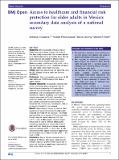| dc.contributor.author | Doubova, Svetlana V | en_US |
| dc.contributor.author | Pérez-Cuevas, Ricardo | en_US |
| dc.contributor.author | Canning, David | en_US |
| dc.contributor.author | Reich, Michael R | en_US |
| dc.date.accessioned | 2015-08-03T13:59:58Z | |
| dc.date.issued | 2015 | en_US |
| dc.identifier.citation | Doubova, Svetlana V, Ricardo Pérez-Cuevas, David Canning, and Michael R Reich. 2015. “Access to healthcare and financial risk protection for older adults in Mexico: secondary data analysis of a national survey.” BMJ Open 5 (7): e007877. doi:10.1136/bmjopen-2015-007877. http://dx.doi.org/10.1136/bmjopen-2015-007877. | en |
| dc.identifier.issn | 2044-6055 | en |
| dc.identifier.uri | http://nrs.harvard.edu/urn-3:HUL.InstRepos:17820714 | |
| dc.description.abstract | Objectives: While the benefits of Seguro Popular health insurance in Mexico relative to no insurance have been widely documented, little has been reported on its effects relative to the pre-existing Social Security health insurance. We analyse the effects of Social Security and Seguro Popular health insurances in Mexico on access to healthcare of older adults, and on financial risk protection to their households, compared with older adults without health insurance. Setting: Secondary data analysis was performed using the 2012 Mexican Survey of Health and Nutrition (ENSANUT). Participants: The study population comprised 18 847 older adults and 13 180 households that have an elderly member. Outcome measures The dependent variables were access to healthcare given the reported need, the financial burden imposed by health expenditures measured through catastrophic health-related expenditures, and using savings for health-related expenditures. Separate propensity score matching analyses were conducted for each comparison. The analysis for access was performed at the individual level, and the analysis for financial burden at the household level. In each case, matching on a wide set of relevant characteristics was achieved. Results: Seguro Popular showed a protective effect against lack of access to healthcare for older adults compared with those with no insurance. The average treatment effect on the treated (ATET) was ascertained through using the nearest-neighbour matching (−8.1%, t-stat −2.305) analysis. However, Seguro Popular did not show a protective effect against catastrophic expenditures in a household where an older adult lived. Social Security showed increased access to healthcare (ATET −11.3%, t-stat −3.138), and protective effect against catastrophic expenditures for households with an elderly member (ATET −1.9%, t-stat −2.178). Conclusions: Seguro Popular increased access to healthcare for Mexican older adults. Social Security showed a significant protective effect against lack of access and catastrophic expenditures compared with those without health insurance. | en |
| dc.language.iso | en_US | en |
| dc.publisher | BMJ Publishing Group | en |
| dc.relation.isversionof | doi:10.1136/bmjopen-2015-007877 | en |
| dc.relation.hasversion | http://www.ncbi.nlm.nih.gov/pmc/articles/PMC4513520/pdf/ | en |
| dash.license | LAA | en_US |
| dc.subject | access to healthcare | en |
| dc.subject | financial risk protection | en |
| dc.subject | health insurance | en |
| dc.subject | older adults | en |
| dc.title | Access to healthcare and financial risk protection for older adults in Mexico: secondary data analysis of a national survey | en |
| dc.type | Journal Article | en_US |
| dc.description.version | Version of Record | en |
| dc.relation.journal | BMJ Open | en |
| dash.depositing.author | Canning, David | en_US |
| dc.date.available | 2015-08-03T13:59:58Z | |
| dc.identifier.doi | 10.1136/bmjopen-2015-007877 | * |
| dash.contributor.affiliated | Reich, Michael | |
| dash.contributor.affiliated | Canning, David | |
| dc.identifier.orcid | 0000-0003-4041-1229 | |


